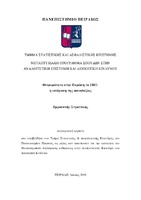Θνησιμότητα στην Ευρώπη το 2015: η επίδραση της αισιοδοξίας
Mortality in Europe in 2015: the effects of optimistic attitude

Προβολή/
Λέξεις κλειδιά
Θνησιμότητα ; Αισιοδοξία ; Έρευνα SHAREΠερίληψη
Στα πλαίσια της παρούσας εργασίας γίνεται προσπάθεια διερεύνησης των παραγόντων οι οποίοι επηρεάζουν τη θνησιμότητα του πληθυσμού. Μία σημαντική παράμετρος στη μελέτη μας είναι η επίδραση της αισιοδοξίας και της θετικής στάσης ζωής. Στο πρώτο κεφάλαιο αναλύεται η έννοια της θνησιμότητας με όλες τις προεκτάσεις της, δηλαδή παρατίθενται οι κύριες αιτίες θανάτου, οι παράγοντες κινδύνου, ενώ, παράλληλα, αναλύεται η έννοια της αισιοδοξίας και οι τρόποι μέτρησής της.
Στα επόμενα κεφάλαια, γίνεται χρήση στοιχείων από την έρευνα SHARE (Survey of Health, Ageing and Retirement in Europe) προκειμένου να διεξαχθεί η στατιστική επεξεργασία και ανάλυση των δεδομένων. Πιο συγκεκριμένα, στο δεύτερο κεφάλαιο παρουσιάζονται οι μεταβλητές που υπάρχουν στη βάση (dataset) και γίνεται μία πρώτη προσέγγιση περιγραφικής ανάλυσής των κυριότερων εξ’ αυτών. Εν συνεχεία, στο τρίτο κεφάλαιο λαμβάνει χώρα η διδιάστατη ανάλυση μέσω μεθόδων περιγραφικής στατιστικής, όπου γίνεται χρήση γραφημάτων, πινάκων συχνοτήτων, ελέγχων ανεξαρτησίας και μέτρων συνάφειας. Έπειτα, στο τέταρτο κεφάλαιο αναπτύσσονται μοντέλα λογιστικής παλινδρόμησης, μέσω των οποίων μελετάται η επίδραση δημογραφικών μεταβλητών, υγείας, νοσηρότητας και αισιοδοξίας στη θνησιμότητα.
Εν κατακλείδι, στο πέμπτο κεφάλαιο συνοψίζονται τα κυριότερα συμπεράσματα που εξήχθησαν μέσω της ανάλυσης των διαθέσιμων δεδομένων. Χαρακτηριστικά, αξίζει να αναφερθεί ότι επιβεβαιώθηκε η επίδραση δημογραφικών παραγόντων, όπως του φύλου, της ηλικίας, της χώρας διαμονής κ.ο.κ. και παραγόντων που σχετίζονται με την υγεία και τη νοσηρότητα. Παράλληλα, από τα παρασυνελευόμενα της έρευνας, ιδιαίτερη αξία έχει η διαπίστωση πως η αισιοδοξία, η ευτυχία και η ικανοποίηση από τη ζωή διαδραματίζουν καθοριστικό ρόλο στη μείωση της πιθανότητας θανάτου.


